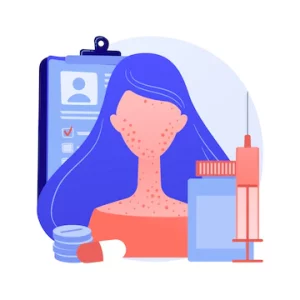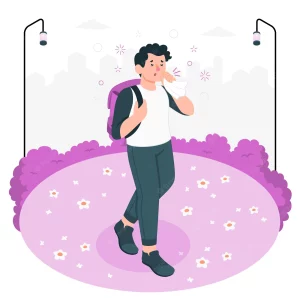Overview
If you’re like the majority of people, you are aware of how painful allergies can be. Sneezing, watery eyes, and an itchy nose could all be present at the same time. You’re going to have an even larger headache if you have allergies in the summer!
Don’t panic, though; there are steps you can take to lessen your symptoms and stay away from bothersome allergies. We’ll go over some of the greatest advice for dealing with allergies in today’s post.
What allergies are and how they might affect you
Reactions to proteins, mold, dust mites, pollens, or other allergens are known as allergies. The symptoms might include hives, asthma, eczema, and hay fever, and they vary according on the allergen. If allergies are not adequately managed, they can become very serious and perhaps fatal. Allergies can affect everyone, even if they are more common in those with certain genes that increase their risk of developing them. The good news is that medicine and lifestyle modifications can effectively treat the majority of allergies.
Reasons Why People Get Allergies
Allergen exposure is one of the most frequent causes of allergies. There are numerous sources of these allergies, such as:
-Mist mites
-Moulds
-Dander from animals
-Vegetables
-Pollens
When the immune system overreacts to these antigens, allergies result. Allergies can affect everybody, and there is no one clear reason why some people are more susceptible to them than others. Still, a few things that could make you more vulnerable are as follows:
-Having respiratory issues, such as asthma
-Having a history of allergies in the family
-Experiencing a wide range of allergies at an early age
The majority of people who acquire allergies are able to manage them with medicine and cautious allergen avoidance. Nonetheless, it’s crucial to get a diagnosis from a physician if you believe you could have an allergy.
Different Allergy Types
It might be challenging to determine which of the numerous varieties of allergies is causing your symptoms. The most frequent allergies and their symptoms are listed below:
-Dust mites: These microscopic organisms produce dander, an allergen that aggravates asthma and hay fever. Carpets, upholstery, bedding, and other surfaces are home to dust mites.
-House dust mites: They reside in homes and are identical to other dust Different Allergy Typesclude allergens that contribute to respiratory issues like asthma.
-Flowers: While some individuals have allergies to actual flowers, others have allergies to the pollen they generate. Some people may get skin rashes, itching, and symptoms of asthma after inhaling pollen from flowers.
-Fish: Food allergies, eczema, and asthma are among the symptoms that some people experience due to sensitivities to fish proteins. Children are more likely than adults to have a fish allergy.
-Eggs: The whites or yolks of eggs can cause allergies in certain persons. Asthma and hay fever are two respiratory conditions that this allergy may induce.
-Milk: Milk proteins can cause allergies in a lot of people.
The signs of allergies
Although allergies can be quite annoying and incapacitating, you can begin to manage them more effectively if you have the correct knowledge. The following are -Eggs of the most typical allergy symptoms: eczema, hay fever, asthma, food allergies, and pet allergies. If you’re experiencing an allergic reaction that doesn’t seem to be responding to over-the-counter remedies, it’s crucial to visit a healthcare professional. Allergic reactions can vary in intensity and length depending on the individual. However, in general, the following advice can help you manage your allergies:
Remain hydrated: Since dehydration can exacerbate symptoms, it’s critical to maintain fluid intake when suffering from an allergy. Even if you don’t feel thirsty, make sure to drink a lot of water.
Steer clear of triggers: Reducing your exposure to foods and situations that trigger allergies can help. Anything from specific pollen types to specific animals or plants can act as a trigger.
Use antihistamines: If you suffer from severe allergies, these medications may help reduce your symptoms. Try not to use them for extended periods of time, though, as they may cause adverse effects like sleepiness.
Use goods designed to help you avoid allergens.
How allergies are treated
Allergies can be somewhat problematic, but they can be managed. The following advice can be used to treat allergies:
-Remain hydrated: To prevent dehydration, which exacerbates allergies, drink lots of water.
-Avoid food triggers: If you are aware of the foods that cause your allergies, make every effort to stay away from them.
-Take medication: Medication can help reduce the symptoms of an allergy. Make sure you discuss the appropriate prescription for you with your doctor.
-Get moving: Exercise is excellent for your general health and can help reduce allergy symptoms.
Keeping Allergies at Bay
Everybody is affected by allergies differently, therefore it’s critical to identify your triggers and take preventative measures to avoid them. The following advice will help you avoid allergies in Boston’s weather:
-Aware of your allergies: Many people have sensitivities to latex, pollens, dust mites, and pets. Discuss with your physician the allergies that cause you the greatest discomfort.
-Avoid going outside during pollen season: In the Boston area, pollen season often lasts from May until September. When pollen counts are high, keep the air conditioning running and the windows closed. Avoid engaging in outdoor activities if you are allergic to pollen.
-Use allergen-free products: It’s critical to use as many allergen-free products as you can if you have allergies. This covers clothes, cosmetics, furniture polish, and household cleaning. Keep surfaces free of allergens tidy and clutter-free.
-Avoid eating out: While it may be challenging to avoid eating out while on vacation, make an effort to restrict your options to eateries that employ allergy-friendly cooking techniques. Take preparing meals at home or selecting menu items that are allergy-friendly, for instance.
What are allergies and what causes them?
The immune system overreacting to specific chemicals is what causes allergies. An allergic reaction is the body’s reaction to an allergen. Allergy symptoms might differ from person to person, but they typically involve sneezing, congestion, itchy eyes, and rash. Animals or plants are the main sources of allergies. The three most prevalent allergens are dust mites, pollen, and pet dander. The primary allergen that causes hay fever is pollen, although pet dander can cause allergic reactions in those who have asthma.
Allergies can be brought on by a wide range of factors, such as the environment (pollen), foods (nuts, eggs), pets (dogs and cats), and medications (antibiotics). There is no single reason for allergies. Allergies cannot be cured, although there are therapies that can help minimize the symptoms.
See your physician if you suspect that you may have an allergy. If required, he or she can provide you with particular allergy testing and treatment recommendations.
Symptoms and Types of Allergies
More than ever, allergies are a concern. Over 20 million Americans, or roughly 7% of the population, suffer from allergies, according to the American Academy of Allergy, Asthma and Immunology (AAAAI). Allergies, regrettably, have the potential to be fatal, particularly in young people and those who are extremely allergic to certain substances. People of all ages, races, and genders can be impacted by allergies.
Allergies can be divided into three categories: medication reactions, food allergies (such as wheat, milk, eggs, and nuts), and environmental (seasonal). When someone has an allergy to something in their environment, like pet dander or tree pollen, it is known as an environmental allergy. Typically, a person’s sensitivity to one or more proteins in particular foods leads to the development of food allergies. Exposure to a foreign material (such as a medication) that compromises the body’s immune system results in drug responses. Hives, trouble breathing, anaphylaxis (a severe allergic reaction that can be fatal), and even psychological conditions like sadness or anxiety are among the symptoms.
Allergies have no known cure, although there are treatments available, including medication, avoidance techniques, and surgery. Therapy varies according on the
Tips for Coping with Allergies
It might be difficult to live with an allergy, but there are solutions to make things simpler. Here are some suggestions for managing allergies in the climate of Boston.
1. Always have an EpiPen on hand: this life-saving drug is used to treat severe allergic reactions. Store one in your car, at home, and anywhere else you might find yourself in need of it. Use your EpiPen as soon as possible if you encounter an allergic reaction.
2. Remain informed: Read allergy-friendly journals like Allergic Living or visit allergyWeb.com to stay up to date on the most recent developments in the world of allergies. Additionally, you can interact online with other allergy sufferers or join support groups for allergies.
3. Keep moving: Even if your allergies prevent you from engaging in hobbies like biking or trekking, you may still maintain good physical health and a positive attitude by going for walks and other mild exercise.
4. Steer clear of allergens: As directed by your physician or allergist, stay away from dust mites, pet dander, and other possible allergens. If you must come into contact with an allergen
The ketogenic diet’s advantages for allergies
The high-fat, low-carb ketogenic diet has been demonstrated to be beneficial for a number of conditions, including diabetes, epilepsy, and weight loss. Now, allergies might benefit from it as well.
Allergies are a prevalent issue that can be challenging to treat. Allergies have no known treatment, however the ketogenic diet may help with symptoms and inflammation reduction. The following are a few advantages of the ketogenic diet for allergies:
1. The body’s inflammatory response may be mitigated by the ketogenic diet. Since the body’s level of inflammation is a major contributor to allergy symptoms, the ketogenic diet may help to alleviate symptoms by lowering inflammation.
2. Because the ketogenic diet is low in carbohydrates and high in fat, it can help you burn fat and increase your metabolism. For those who suffer from allergies, this is advantageous as it can aid in symptom management and inflammation reduction.
3. Antioxidants and anti-inflammatory elements like omega-3 fatty acids are abundant in the ketogenic diet. These nutrients can support a robust immune system and lessen allergy-related symptoms.

Items to Steer Clear of If You Have Allergies
Many foods have the potential to trigger allergies, but a few that are particularly popular are dairy products (milk, cheese), eggs, cereal grains (wheat, rye, and barley), peanuts, and tree nuts. It’s crucial to speak with your doctor about the foods to avoid during high pollen season because in some places, summertime might bring high pollen counts.
The greatest defense against food allergies is to keep away from anything that can trigger an allergic reaction. For someone with a severe allergy, this could entail avoiding all food for a given amount of time or avoiding particular foods completely.
If you have an allergy, you should avoid the following specific foods:
-Nutty trees:
-Almonds:
-Grain cereals:
-Dairy items:
-Eggs
Allergies: What Are They?
Reactions to pollen, dust mites, pet dander, smoke, food additives, and chemical sensitizers like paints or fumes can all cause allergies in today’s Boston weather. It’s critical to understand which allergens can cause a reaction in you in order to lower your chance of being allergic to them.
Pollens from grass, trees, and weeds; dust mites; pet dander; smoking; food additives like gluten, dairy, and soy; and chemical sensitizers like paints and fumes are the most prevalent allergens.
Contact your physician if you are experiencing breathing difficulties or any other symptoms following an allergy encounter. Serious allergic reactions may occur, necessitating prompt medical intervention.
Go to the National Institute of Allergy and Infectious Diseases (NIAID) website to find out more about allergies and how to lower your chance of getting them.
Sources of Allergy Symptoms
We will talk about the various reasons of allergy symptoms in this blog. We will also talk about how seasonal pollen allergy sufferers may be impacted by the weather in Boston.
The Mayo Clinic states that there are numerous reasons why allergy symptoms can arise. Among the most typical causes are:
• Infections — People who are already sensitive to particular allergens may experience an allergic reaction to certain infections, such the flu.
• Genetics: Some people are just genetically predisposed to allergy reactions more often than others.
• Environmental factors: People who are allergic to dust mites or pet dander may experience a reaction if they are exposed to these allergens.
Types of Allergies
Allergies come in a variety of forms, and some people are more susceptible to them than others. The most prevalent kinds of allergies and associated symptoms will be covered in this article.
Hay fever is the name for the most prevalent kind of allergies. When exposed to particular allergens, such as grass, pollen, or dust mites, people with hay fever often have an itchy, red nose, and watery eyes. Breathing problems, a beating heart, and anaphylaxis—a potentially fatal reaction that results in unconsciousness—are some more symptoms.
Environmental and food allergies are two more prevalent forms of allergies. Sensitivity to specific proteins in food products, like dairy or almonds, is known as a food allergy. When a person is allergic to compounds found in the environment, such as mold from moist regions or tree pollen, environmental allergies emerge.
Individuals who are allergic to an allergen typically become immune to it over time. Even after being previously exposed to the allergen, some persons are nonetheless prone to developing an allergy. This occurs as a result of an improper immune system response to the allergen, which makes them more susceptible to it. Because of this
How to Handle Allergies
Avoiding the allergen is the most crucial move to take if you are having an allergic response. The next step is to determine which allergen is causing your symptoms if you are unable to avoid it. Treating your allergy comes next after you’ve determined what allergen it is.
Tips for Preventing Allergies
The best defense against allergies is prevention! The following advice can help you manage your allergies:
1. Verify that you are getting adequate vitamin D, which aids in the defense of your body against allergies. Vitamin D can be obtained from vitamin supplements, fatty fish, and sunshine.
2. Steer clear of allergens such as pollens whenever you can. Those with delicate respiratory systems are susceptible to allergic responses brought on by pollen and other allergens. When pollen season arrives, keep windows closed and try to avoid going outside as much as possible if you have severe allergy problems.
3. Consider implementing an allergy prevention plan. Keeping a plan will enable you to monitor your symptoms and identify the allergens that are bothering you. By doing this, you can lessen your exposure to those allergens and increase the likelihood that you won’t have an allergic reaction.
4. Obtain a seasonal allergy vaccination. Certain vaccinations guard against particular allergy conditions, such as hay fever, asthma, and eczema in kids. Find out from your doctor which vaccine is right for you.
In summary
It’s crucial to be ready as allergy season approaches. The following advice will help you stay well this season:
– Recognize the signs of common allergies and act upon them if you encounter them.
-Drink lots of fluids to stay hydrated throughout the day, especially when pollen season is among us.
-Avoid environmental stressors like pollution, dogs, and specific plants as much as you can.











